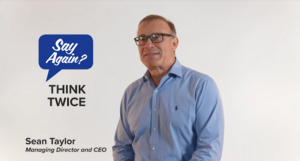The National 2017 Group
Everyday sexism occurs, as the name suggests, in both the formal and casual interactions between people. It happens in daily life. It happens frequently in workplaces. They are sometimes the little things, said or done in a moment, that play into stereotypes of gender. Perceived as too small to make a fuss about, we let it pass. At other times there is no question that it oversteps the mark. Whether big or small, it is important to take action on everyday sexism.
In our contexts, everyday sexism also comes into play at critical decision points. As a result, it affects the progress and careers of women and men, influencing who to appoint, develop, sponsor, reward or promote. Everyday sexism is frequently invisible, and often accepted. Because it is hard to speak up when it occurs, it continues unchecked.
In examining this topic, we have learned that context, culture, generational differences and norms are among some of the factors that underpin everyday sexism. Most people do not want to be accused, let alone guilty of sexist behaviour. However often, well-intentioned words, actions and decisions are not received that way. Or worse, they can be outright offensive.
Tackling everyday sexism to create respectful and inclusive workplaces relies on inspirational leaders. Leaders bridging the gap between organisational frameworks and specific initiatives through authentic real stories in their own voice. Tackling everyday sexism requires leaders to be aware and conscious of the behaviours that reinforce stereotypes and inhibit people’s ability to speak up; and to move themselves and others to action.
Here are some practical examples from organisations addressing the issue of everyday sexism in the workplace:
Transdev Case Study: #ItsNotOkToday campaign
What we heard: Focus Group results demonstrated that Transdev employees had a lack of awareness about everyday sexism and sexual harassment and its impacts. It revealed that everyday sexism takes place across the organisation through comments, promotion decisions, jokes and more broadly within the communities in which our employee’s work – on public transport.
Action taken: Transdev developed a marketing campaign called “It’s Not Okay Today”, asking its people to commit to calling out everyday sexism by responding with “It’s Not Okay Today”.
The marketing campaign featured senior leaders with the caption “I commit to calling out everyday sexism” and poster pledges of commitment signed by numerous leaders. Transdev also communicated the purpose of the campaign to employees, together with examples of everyday sexism on Transdev’s intranet site.
Impact: The phrase, “It’s Not Okay Today” has been overheard across the business as staff are aiming to call out everyday sexism behaviour and ensure they are active Up-standers.
Komatsu: “Say Again?” everyday sexism campaign
 What we heard: Komatsu conducted Focus Groups across the organisation. It revealed that employees had a lack of awareness about everyday sexism and its impacts and that everyday sexism takes place across the workplace. The insights shared in these focus groups informed how Komatsu could best approach the campaign.
What we heard: Komatsu conducted Focus Groups across the organisation. It revealed that employees had a lack of awareness about everyday sexism and its impacts and that everyday sexism takes place across the workplace. The insights shared in these focus groups informed how Komatsu could best approach the campaign.
Action taken: Komatsu launched the “Say Again?” everyday sexism campaign. All employees were encouraged to call out sexist comments and behaviour, by responding with “Say Again?”. The campaign launch, featured Sean Taylor – CEO of Komatsu – sharing the organisation’s stance against everyday sexism. It also included a video of leadership talking about EveryONE counts (Komatsu’s inclusion and diversity strategy), why “Say Again?” is so important, and how to appropriately react to sexist comments.
Without diminishing the focus on everyday sexism, Komatsu further enhanced the messaging to also include any form of inappropriate comment in the workplace (ageist, racist, etc.).
Impact: Addressing everyday sexism head on with a supported culture change.
Employees have reached out to thank Komatsu for the “Say Again?” campaign, noting that the campaign is having a strong positive impact on their professional as well as their private lives. Responding with “Say Again?” allows employees to respond to inappropriate comments in a non-confrontational and respectful way.
The “Say Again? campaign went viral in Komatsu’s head office and across many regional locations. CEO Sean Taylor’s post on LinkedIn promoting the campaign reached an audience of 8,700.
Further information
Male Champions of Change are taking action to understand and address everyday sexism. This work is captured in We set the tone – Eliminating Everyday Sexism resource which is available for leaders to adopt or adapt for use in their organisation.
